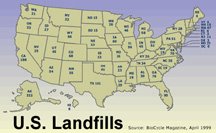EPA: Don't worry about Stark
The Times-Reporter
BOLIVAR - The head of the Ohio Environmental Protection Agency told Tuscarawas County Commissioner Chris Abbuhl in a letter that while the scale of problems at Countywide Recycling and Disposal Facility might have created confusion about enforcement policies, he believes the Stark County Health Department follows proper citation procedures.
The letter from OEPA Director Chris Korleski, dated Friday, came in response to one Abbuhl sent March 7 asking Korleski to examine inspection processes between the agency’s Southeast and Northeast districts. In his letter, Abbuhl highlighted that both Countywide at East Sparta and American Landfill at Waynesburg took in more than three times the amount of trash that Kimble Landfill at Dover did in 2005 and 2006, yet Countywide and American received only a handful of violations while Kimble was cited almost weekly.
Korleski’s letter emphasizes that the Ohio EPA strongly encourages all health departments to follow the policy: “If you see a violation, cite the violation.” Korleski said Tuscarawas County’s numerous citations demonstrate it is following that policy and, “I am advised by my staff ... that Stark County follows the same policy.”
However, Korleski wrote that Abbuhl’s letter “has triggered a great deal of thinking on our part on this inconsistency issue.” Korleski said he specifically will consider the issue in regard to the Ohio EPA’s annual review of county health departments, which includes a field survey through which the agency judges “the local inspector’s ability to recognize and cite violations appropriately.”
Korleski also wrote that Countywide presented a “unique technical situation,” which, combined with confusion about what fell under solid waste rules and what fell under air pollution regulations, might have led to no solid waste violations being cited “during a period when we all know Countywide was causing a significant odor problem.”
The Ohio EPA chief did draw distinction between how things operated under his predecessor and how he plans to handle odor nuisance complaints. Korleski wrote that by his understanding, under the former director his agency “and presumably the Stark County Health Department” did not believe an odor complaint about a solid waste landfill would trigger the odor nuisance rule unless it was accompanied by a violation citation about the landfill’s operation, such as failure to apply daily soil cover.
“I am not inclined to believe that such a separate operational violation is necessary,” Korleski wrote, adding that his staff will investigate how the odor nuisance rule should be applied.
Abbuhl said Korleski’s response did not address all points of his letter – inspections at American Landfill, for instance – but that he was glad Korleski would keep his concerns in mind during the annual field surveys of county health departments.
“If nothing else, this is putting a watchful eye on our departments,” Abbuhl said. “I’m still surprised at the difference in the violations, but I’ll have to accept his findings.”
William Franks, health commissioner for Stark County, was listed as a recipient of the letter but said Monday that he had not received his copy yet, and he declined comment until he received it. Franks previously wrote a letter to the board of directors of the Stark-Tuscarawas-Wayne Joint Solid Waste District expressing displeasure with Abbuhl for comments in a Times-Reporter story in which Abbuhl said he sent his letter to the OEPA in hopes of “leveling the playing field.”













<< Home